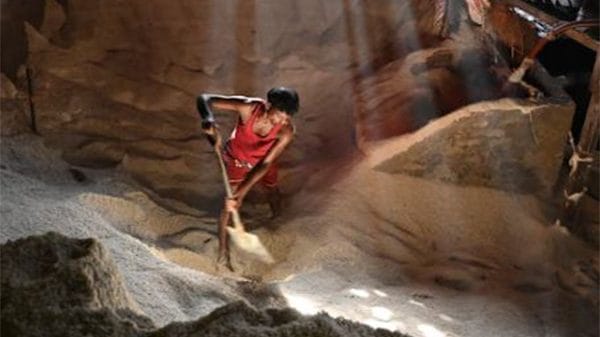Thank you dear subscribers, we are overwhelmed with your response.
Your Turn is a unique section from ThePrint featuring points of view from its subscribers. If you are a subscriber, have a point of view, please send it to us. If not, do subscribe here: https://theprint.in/subscribe/
On December 18th 2024, the world celebrated the 34th International Migrants Day. India has the largest diaspora in the world at 15.5 million but it also witnesses large scale inter-state migration. The following feature documents the real-life conditions of some migrants from Bihar in Bangalore. Names have been changed for privacy purposes.
It is 05:00 am in the morning. Sahil, a young migrant worker from Bihar, switches on the lights of the mess area at Aarav Paying Guest (PG) accommodation in Bangalore and wakes his companions up. By 05:10 am whistles of the pressure cooker start to go off and he begins to chop vegetables for breakfast while the others unload trucks full of groceries, carry the load upstairs, boil milk, mop the floor and wait for their first five minutes break at 10:00 am when they get to have whatever is left from the breakfast they prepared for over 200 guests and staff. The guests fill their tiffins with extra portions for their friends or to have ‘breakfast for dinner’, emptying the containers faster than they can keep up with. ‘Bhaiya, garam banao na’ (Brother, serve fresh portions), demands a girl as she rejects the semi-hot parathas which refilled the container just 5 minutes ago.
“Agla chutti kab hai aapka?” (When is the next holiday?) inquires Sahil as he awaits the day when breakfast begins two hours later than the usual schedule. Sunday is the only day of respite as snacks and dinner are not served on that day. Once in a week Sahil finds the time to venture about 2-3 kms in a city he has spent 2 years in because Sundays are also designated to be ‘deep cleaning’ days when the ‘off hours’ are occupied for various sanitation duties.
Endless chopping of vegetables to prepare the elaborate seven-course luncheon is undertaken. Non-guests occupy corner seats and try to escape both, the gaze of ‘Maharaj’, the head chef and tasteless palate served at their accommodations. “Touch Wood!”, shouts a girl as she tries to prevent the evil eye of her friend who praises the taste of a curry that has more paneer and vegetables rather than gravy. A rare phenomenon indeed!
Sahil is required to pack lunch boxes for at work delivery and each carries different verbal instructions given during breakfast as guests are not allowed to contact the staff directly.
By this time the cleaning ladies have divided themselves in two groups and cleaned all the rooms. Time passes by as they talk to each other, phone family members, politely listen to demands and complaints, and sometimes get their sick child to work. They complete their ‘9-5’ non-corporate workday.
When asked about why she did not go home for Diwali or more importantly Chhath Puja, Aarti, whose husband works as a delivery person in Zomato, replies, “There are no holidays for us. Anyhow, my family lives here with me and there is nothing to visit my village for. We have asked for holidays but they don’t permit it.” On Sundays, when they are not required to clean rooms, they clean the corridors, window panes, staircases, front office, gym area and terrace.
Sahil will go home next year. When asked why he plans to add a third year of not visiting his hometown, he eludes the monetary aspects of the question and blames the tiring two-day long train ride.
“What else do we require?”
A power nap is taken post lunch in the lodgings built inside the kitchen. This is one of the reasons for continuing this job. Sahil feels satisfied with the arrangements where food, shelter and access to washing machines is provided. He gets along with his companions.
“Aren’t you praising a bit too much?”, Prasad satirically remarks. Washing utensils from noon to midnight has caused his skin to peel off. Regardless of Eczema, he continues to wash all the utensils alone. Just when he thinks his work is done, the cleaning ladies bring piles of plates that guests keep outside their rooms, often filled with leftover food covered in mold. He has decided to leave for his village where he shall be paid ₹20,000 per month at a construction site. Work he finds to be less physically taxing and better paying. “At least I will live with my children”.
By 10:30 pm they alternate between having dinner and preparing for the next day. Sahil sleeps by 01:00 am. Here, neither does one live for food or eat food to live. They cook food for others to afford a minimum standard of living.
“Pain is for the weak, stress is for the privileged”
Prasad was shifted to another building where the number of guests were less. A solution to the problem was still not found, medical bills were paid by himself and a younger person was hired.
Two weeks later, a smiling Prasad passed by unrecognised. After being stopped he shared that he was leaving for his village the next day. The medicines cured his hands but that was not enough to hold him back.
He refused to say goodbye and said, “you never know sister, Biharis can be found anywhere.”
These pieces are being published as they have been received – they have not been edited/fact-checked by ThePrint.


